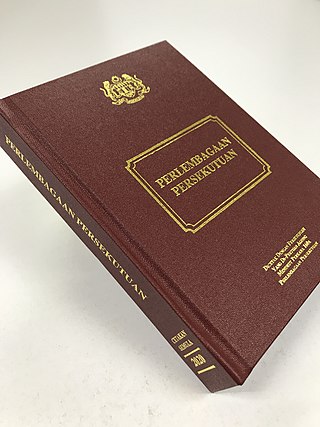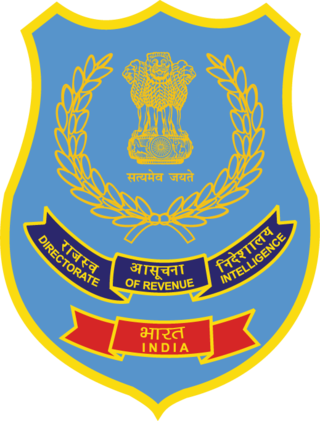
The Federal Constitution of Malaysia, which came into force in 1957 as the Constitution of the Federation of Malaya and was amended in 1963 to form the Constitution of Malaysia, is the supreme law of Malaysia and contains a total of 183 articles. It is a written legal document influenced by two previous documents, the Federation of Malaya Agreement 1948 and the Independence Constitution of 1957. The Federation was initially called the Federation of Malaya and it adopted its present name, Malaysia, when the states of Sabah, Sarawak and Singapore became part of the Federation. The Constitution establishes the Federation as a constitutional monarchy, having the Yang di-Pertuan Agong as the Head of State with largely ceremonial roles. It provides for the establishment and organisation of three main branches of the government: the bicameral legislative branch called the Parliament, which consists of the House of Representatives and the Senate ; the executive branch led by the Prime Minister and his Cabinet Ministers and the judicial branch headed by the Federal Court.

A customs officer is a law enforcement agent who enforces customs laws, on behalf of a government.
The Tariff of 1842, or Black Tariff as it became known, was a protectionist tariff schedule adopted in the United States. It reversed the effects of the Compromise Tariff of 1833, which contained a provision that successively lowered the tariff rates from their level under the Tariff of 1832 over a period of ten years until the majority of dutiable goods were to be taxed at 20%.
The Kennedy Round was the sixth session of General Agreement on Tariffs and Trade (GATT) multilateral trade negotiations held between 1964 and 1967 in Geneva, Switzerland. Congressional passage of the U.S. Trade Expansion Act in 1962 authorized the White House to conduct mutual tariff negotiations, ultimately leading to the Kennedy Round. Participation greatly increased over previous rounds. Sixty-six nations, representing 80% of world trade, attended the official opening on May 4, 1964, at the Palais des Nations. Despite several disagreements over details, the director general announced the round's success on May 15, 1967, and the final agreement was signed on June 30, 1967—the last day permitted under the Trade Expansion Act. The round was named after U.S. President John F. Kennedy, who was assassinated six months before the opening negotiations.

The Competition and Consumer Act 2010 (CCA) is an Act of the Parliament of Australia. Prior to 1 January 2011, it was known as the Trade Practices Act 1974 (TPA). The Act is the legislative vehicle for competition law in Australia, and seeks to promote competition, fair trading as well as providing protection for consumers. It is administered by the Australian Competition & Consumer Commission (ACCC) and also gives some rights for private action. Schedule 2 of the CCA sets out the Australian Consumer Law (ACL). The Federal Court of Australia has the jurisdiction to determine private and public complaints made in regard to contraventions of the Act.

The Customs and Excise Department (C&ED) is a government agency responsible for the protection of the Hong Kong Special Administrative Region against smuggling; the protection and collection of revenue on dutiable goods on behalf of the Hong Kong Government; the detection and deterrence of drug trafficking and abuse of controlled drugs; the protection of intellectual property rights; the protection of consumer interests; and the protection and facilitation of legitimate trade and upholding Hong Kong's trading integrity.
The Internal Security Act 1960 was a preventive detention law in force in Malaysia. The legislation was enacted after the Federation of Malaya gained independence from Britain in 1957. The ISA allows for detention without trial or criminal charges under limited, legally defined circumstances. On 15 September 2011, the Prime Minister of Malaysia, Najib Razak said that this legislation will be repealed and replaced by two new laws. The ISA was replaced and repealed by the Security Offences Act 2012 which has been passed by Parliament and given the royal assent on 18 June 2012. The Act came into force on 31 July 2012.

A bonded warehouse, or bond, is a building or other secured area in which imported but dutiable goods may be stored, manipulated, or undergo manufacturing operations without payment of duty. They may then be again exported without payment of duty. It may be managed by the state or by private enterprise. In the latter case a customs bond must be posted with the government. This system is widely used in developed countries throughout the world.

The Directorate of Revenue Intelligence (DRI) is an Indian intelligence agency. It is India's apex anti-smuggling intelligence, investigations and operations agency.

The Royal Malaysian Customs Department ; is a government department body under the Ministry of Finance. RMCD functions as the country's main indirect tax collector, facilitating trade and enforcing laws.
Amending the Constitution of India is the process of making changes to the nation's fundamental law or supreme law. The procedure of amendment in the constitution is laid down in Part XX of the Constitution of India. This procedure ensures the sanctity of the Constitution of India and keeps a check on arbitrary power of the Parliament of India.

The Malaysia Bill is an annex of the Agreement relating to Malaysia between United Kingdom of Great Britain and Northern Ireland, Federation of Malaya, North Borneo, Sarawak and Singapore. It gave effect to the Agreement where that the British colonies of North Borneo, Sarawak and the State of Singapore should be federated with the existing States of the Federation of Malaya and the name of the federation should be Malaysia, and the Federal constitution wherewith to amend and adopt the Constitution of the Federation of Malaya so as to provide for the admission of those States. it adopted its present name, the name of the Constitution of the Federation of Malaya should be changed into Constitution of Malaysia.

The Communications and Multimedia Act 1998 is an Act of the Parliament of Malaysia. It was enacted to provide for and to regulate the converging communications and multimedia industries, and for incidental matters.

The Strata Management Act 2013, is a Malaysian laws which enacted to provide for the proper maintenance and management of buildings and common property, and for related matters.

The Immigration Act 1959/63, is a Malaysian law which relates to immigration.

The Malaysian Anti-Corruption Commission Act 2009 is an Act of the Parliament of Malaysia. It was enacted to provide for the establishment of the Malaysian Anti-Corruption Commission, to make further and better provisions for the prevention of corruption and for matters necessary thereto and connected therewith.

The Excise Act 1976, is an Act of the Parliament of Malaysia. It was enacted to amend and consolidate the law pertaining to excise in Malaysia.
The Constitution of Penang, introduced in 1957, is the fundamental law of the Malaysian state of Penang. The constitution, which came into effect just before the independence of the Malayan Federation from the British Empire, concerns the formation and proceedings of the state government. It also establishes the Governor as the head of state who acts in the discretion of the Chief Minister, the head of government.
The constitutional provisions in India on the subject of distribution of legislative powers between the Union and the States are defined primarily under its articles 245 and 246. The Seventh Schedule to the Constitution of India specifies the allocation of powers and functions between the Union and the State legislatures. It embodies three lists; namely, the Union List, the State List, and the Concurrent List. The Union list enumerates a total of 97 subjects over which the power of the Union parliament extends. Similarly, the State list enumerates a total of 66 subjects for state legislation. The schedule also spells out a Concurrent list embodying a total of 47 subjects on which both the Union parliament and the state legislatures are empowered to legislate, though this is subject to the other provisions of the constitution that give precedence to the union legislation over that of the states.

The Biosecurity Act 2015 is an Act of the Parliament of Australia which manages biosecurity risks in Australia. It was enacted on 16 June 2015, after the Bill was passed with bipartisan support on 14 May 2015. It covers both agricultural and human medical biosecurity risks, including epidemics and pandemics, and is designed to contain and/or deal with any "diseases and pests that may cause harm to human, animal or plant health or the environment" in Australia.









